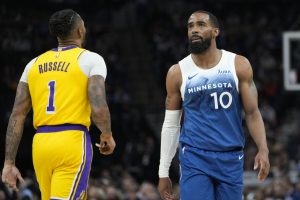
Column: Dodgers “fully throttle” Red Sox with $325 million Yamamoto contract
The promise of a “full throttle” Red Sox offseason, already an unrealistic dream, was officially broken on Thursday night, when Jack Curry of YES Network broke the news that the Los Angeles Dodgers had won the Yoshinobu Yamamoto sweepstakes.
It’s the latest in a string of enormous, historic offseason transactions by the Dodgers, and the latest in a long line of Red Sox disappointments.
Yamamoto completes an Orion’s belt of shining new stars; already in the last two weeks, the Dodgers gave Shohei Ohtani a record $700 million while also trading for and extending Rays star Tyler Glasnow. According to Jeff Passan of ESPN, Yamamoto’s is a 12-year, $325 million deal. There’s no deferred money, a $50 million signing bonus and player opt-outs after the ’29 and ’31 seasons. The Dodgers must also pay a $50.6 million posting fee to Yamamoto’s Nippon Professional Baseball team, the Orix Buffaloes. It’s not only unprecedented for the posting system, but also the richest and longest pitching contract in MLB history.
Without a doubt, giving a contract of this magnitude to a player who’s never seen Major League action is a gamble. But as one of the league’s richest clubs, the they can afford it (so, too, are the Red Sox). The Dodgers have entered uncharted spending territory, and by committing over $1.2 billion (including Yamamoto’s posting fee) to this trio, leave no room for doubt about their priorities.
The Red Sox are over a billion behind in their own offseason spending. That sends a clear message, too.
At Craig Breslow’s introductory press conference in early November, chairman Tom Werner announced that they had to “be full throttle in every possible way” during the offseason. The bold proclamation is aging about as well as Brian Cashman’s boastful “Do damage” comments in 2018, especially because the Red Sox had more short- and long-term financial flexibility than most of Yamamoto’s other suitors.
While the Yankees were reportedly offering Yamamoto $300M, and the Mets matched the Dodgers’ sum, Boston seemingly waved the white flag by pivoting to other free-agent arms on Thursday. According to one source, the Red Sox were willing to offer him more than they gave David Price – whose seven-year, $217M was a league record for a pitcher at the time and the franchise’s biggest commitment before Devers’ 10-year, $313.5M extension last January – but would only go so far. Why, when their only guaranteed financial commitment beyond the ’27 season is Devers’ salary?
Perhaps the Red Sox will claim that a deal of this size may not be financially prudent because it could impact future spending ability. Yet such signings are never about prudence, they’re investments in one’s club. A franchise’s reputation and fortunes are enhanced by the very presence of a superstar. Signing a marquee player would’ve signaled to the rest of the league that they were ready to be The Red Sox again. Among other benefits, it would’ve make them a more appealing destination for other players.
Another benefit, which should’ve highly motivated them, was the money they stood to make. The Dodgers are already reaping the rewards of their billion-dollar risks. When Fanatics released Ohtani’s Dodgers jersey last week, it broke the company’s previous all-time record for highest sales within the first 48 hours – Lionel Messi’s – by more than double. According to KTLA, the average price of a Dodgers regular-season home game is up 71% since the Ohtani signing. Last week, Forbes announced that the average Opening Ticket price skyrocketed to $1,236. And that was before they got Yamamoto.
At this rate meanwhile, a Red Sox fan will be able to buy a bleacher seat to every Fenway game and still spend hundreds less than the price of a single ticket to Los Angeles’ home opener.
When it comes to courting free agents, there is little beauty in failed attempt. The Red Sox don’t get trophy for managing to stay in the mix; he was the only prize. They needed to spend, even grossly overspend, on a superstar who could reinvigorate the team and fanbase, and have officially failed to do so. Yamamoto, Ohtani, and Juan Soto, the three biggest names of the offseason, are off the board, as are several other high-level talents. Their most notable move thus far is trading Alex Verdugo to the Yankees, and based on his comments earlier this week, he’s eager to make them regret it.
Even if Boston had blown other teams out of the water with their offer, it may not have been enough. They’ve spent much of the last half-decade acting like they care more about saving money than winning. As a result, free agents are no longer champing at the bit to come to Boston, Yamamoto included. His interest was called into question throughout his negotiating window. Though several Japanese pitchers have won World Series in Boston, and the Red Sox currently have three Japanese-speaking employees on their medical staff and his former teammate and good friend, Masataka Yoshida, on the roster, they were not one of the teams with whom he wanted to meet in person for a second time. He flew to New York to speak with the Mets and Yankees, but didn’t feel the need to visit Fenway Park.
In mid-September, moments after the Red Sox had abruptly dismissed Chaim Bloom, team president and CEO Sam Kennedy sat in Fenway’s interview room and proclaimed, “I believe there’s alignment around what our ultimate goal is and what our North Star is. Our North Star is winning championships and is playing baseball in October, and has been since the day we got here in February of 2002, and that will never change as long as this ownership is in place.”
“I assure you,” he added. “If that (hasn’t been clear), then shame on me and shame on us.”


